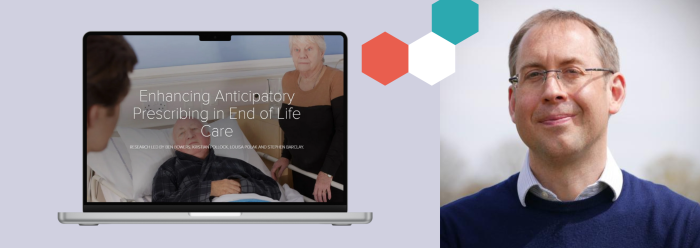The recent passing of the Terminally Ill Adults (End of Life) Bill has brought much-needed attention to end of life care. However, there has been limited discussion around other ways to enhance the dying experience for all those involved. In this blog, Dr. Ben Bowers explores current practices and understanding surrounding injectable anticipatory prescribing.

Dr. Ben Bowers is the Deputy Theme Lead for Palliative and End of Life Care at ARC East of England and a Wellcome Post-Doctoral Fellow, Primary Care Unit, Department of Public Health and Primary Care, University of Cambridge.
Dying in pain or distress is a cause of considerable concern for patients who are receiving end of life care, their families, carers and clinicians. The recent parliamentary debate and vote in favour of the bill to legalise assisted dying in England and Wales has brought great attention to inequalities in dying symptom control care. Many people die in comforting and familiar space, surrounded by those important to them, free from pain and distress. However, a recent survey of bereaved family and friend carers in England and Wales emphasises how problematic dying symptom control care can be at home.
"Almost 40% of self-selecting respondents reported that people dying at home were severely or overwhelmingly affected by pain, breathlessness and anxiety in their last week of life; whether people were prescribed or received oral and injectable medications to help manage symptoms in their final days is unclear."
Dr. Ben Bowers, Deputy Theme Lead for Palliative and End of Life Care at ARC East of England
It is imperative that people have access to timely and effective last-days-of-life symptom control, regardless of whether assisted dying is legalised. Data shows that when assisted dying is an option, few terminally ill people choose this. Helping terminally ill people to live as well as possible and die in comfort, without hastening or delaying death, are essential components of good end-of-life care.
"The anticipatory prescribing of injectable symptom control medications is a key and common clinical intervention to help control distressing symptoms for people dying of expected causes at home or in care homes."
Dr. Ben Bowers, Deputy Theme Lead for Palliative and End of Life Care at ARC East of England
Anticipatory prescribing is intended to help prevent delays in families having to source a medical assessment and prescription in a crisis, especially during the night or at weekends. Injectable anticipatory medicines are routinely prescribed for five common symptoms: pain, breathlessness, nausea and vomiting, agitation and noisy respiratory secretions. These are typically prescribed by a GP and dispensed to a named patient.
These medicines do not hasten death. Dying people often reach a point where they are unable to swallow their oral medication and these injectable formulations provide a way to quickly meet any symptom control needs. In the UK, it is standard practice for visiting community nurses or paramedics to make a clinical assessment of need before deciding whether to administer anticipatory medicines. Not all dying patients need these drugs: between 40% and 54% of anticipatory prescriptions go unused.
Since anticipatory prescribing is a central tool in how we can best manage distressing last-days-of-life symptoms in the community, it is vital that we use the intervention in a person-centred way and ensure systems are in place to provide timely, effective and safe care. Yet there are gaps in our understanding regarding how to achieve this. The widespread practice of anticipatory prescribing and its underpinning policy is based on clinicians’ perceptions that the intervention offers reassurance to all involved and provides effective, timely symptom relief. There is limited evidence to draw conclusions about the appropriate use, clinical effectiveness, and safety of anticipatory prescriptions. The presence of anticipatory prescriptions in the home can be simultaneously comforting and an unwelcome reminder for people and their families of impending death. People face inequalities in their experiences of dying as well. For example, where they live, and their networks of support, affect their access to services and timely symptom control care too.
"The Terminally Ill Adults (End of Life) Bill 2024-25 is bringing more attention to end of life care, yet regardless of whether assisted dying is legalised, we still need to understand how to improve dying experiences and the use of anticipatory medications."
Dr. Ben Bowers, Deputy Theme Lead for Palliative and End of Life Care at ARC East of England
The programme of research I lead aims to understand and improve dying symptom control care. My interest in this area has been shaped by my experiences and insights as a community nurse and palliative care specialist. This critical part of end of life care is close to my heart and one I care passionately about getting right.
If you are interesting in learning more about anticipatory prescribing, then read our new ARC Anticipatory Prescribing Evidence Resource. In this resource, we share our extensive research covering topics such as reviewing the existing evidence base, changes in practice since the COVID-19 pandemic, the perspectives of dying people and their families, the financial costs of anticipatory prescriptions, and solutions for system-level change.
Access the Anticipatory Prescribing Evidence Resource here
If you would like to explore this research further, contact Dr. Ben Bowers via email bb527@medschl.cam.ac.uk.
